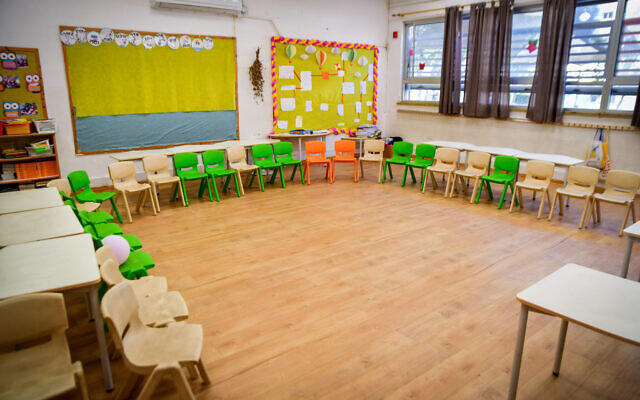For a lot of putting academics, wage woes simply the tip of a deeper malaise

“Working as a instructor gave me a way of function, I used to be educating the following era, serving to youngsters succeed, connecting with them and making a distinction to their lives,” says Chen Peleg, a former English instructor of ten years who stop instructing final yr.
“Ultimately although that wasn’t adequate for me as a result of there was a lot unfavorable vitality surrounding the job that I made a decision I didn’t want it in my life anymore. So I stop.”
Though Peleg, who requested that her actual title not be used, insists the low wage she earned, typical of junior academics, was not the one cause she walked away from instructing, she mentioned it was a key consider her determination.
Peleg’s story is much like that of many younger academics in Israel who begin off on an ideological journey to assist college pupils succeed and find yourself so disenchanted and dissatisfied with their occupation that they merely go away.
Her expertise instructing for a decade within the Israeli training system serves because the backdrop to the disaster that unfolded this week in Israel, through which 1.5 million preschool and faculty youngsters have been left at house as academics went on strike — initially for a number of hours a day, however on Wednesday and Thursday for the total college day.
However though these strikes targeted on pay raises for academics, the issues within the training system seem to run far deeper.

View of an empty college in Tel Aviv, throughout a strike by the Lecturers Union, June 19, 2022. (Avshalom Sassoni/Flash90)
Listening to academics it’s simple to grasp why many resolve to surrender on their chosen occupation.
The pay is poor…
Web salaries for brand spanking new academics and even those that have been instructing for over ten years are extraordinarily low compared to the nationwide common wage, whereas the calls for on academics from mother and father and faculty directors, in addition to the workload in all its facets, are extraordinarily excessive.
The common wage for brand spanking new academics, who are sometimes solely employed part-time, is simply NIS 5,287 (some $1,530), in response to figures from the Finance Ministry.
Rising seniority within the occupation does finally result in salaries of as a lot as NIS 20,000 ($5,800) a month, however it may well take many years to earn such sums, and lots of younger academics languish for too lengthy and not using a dwelling wage.
Peleg, for one, mentioned her wage of simply NIS 7,000 ($2,000) by the top of her time in instructing was merely not enough for the wants of her household.
Such sentiment is widespread.
Robi Naon, a ninth-grade instructor on the Katzir Faculty in Holon, described his NIS 8,000 ($2,300) wage after 12 years as a instructor as “a slap within the face” to him and the occupation normally.

Robi Naon, a ninth-grade instructor, in his classroom on the Katzir Faculty in Holon. (Courtesy)
“I selected to be a instructor as a result of I’m a values-based individual, I imagine our future will depend on training, and I believe it’s holy work and it’s one thing that provides me plenty of satisfaction,” mentioned Naon, who has been a number one activist within the academics’ union’s calls for for wage rises.
However he argues that the low salaries for a lot of academics make them go away the occupation for extra remunerative careers, and provides that attracting proficient people to instructing within the first place is extraordinarily tough for a similar cause.
Salaries aren’t nonetheless the one concern for a lot of academics.
… however that’s not all
For Peleg, the extreme calls for of the job and what she felt was the dearth of appreciation by all events for the work of academics was an equally weighty consideration in her determination to depart the occupation.
After the varsity day, and after caring for her personal younger youngsters and placing them to mattress, she would want to arrange classes and exams for her pupils, work on assignments for supplementary programs which academics are inspired to take with a view to advance of their careers and enhance their salaries, and deal with academics conferences and communication with mother and father.
And he or she discovered the perspective of many mother and father and principals, who would each blame academics for the poor efficiency of their pupils, tough to abdomen.
“None of them would settle for that there are systemic issues like lecture rooms with too many pupils, or that the pupils themselves and the mother and father have any duty for a way their baby does in class,” mentioned Peleg.
Ruti, a principal for 30 years of a prestigious Jerusalem college who declined to offer her actual title, concurred with Peleg’s assertion that the instructing occupation shouldn’t be revered in Israel and argued that incorrect and unfavorable attitudes in direction of academics are partly liable for the present state of affairs.
She says stigmas about academics not being clever or hard-working sufficient to succeed outdoors of the training system persist, and that folks typically don’t perceive the heavy funding of time and vitality academics make outdoors of faculty hours.
“The low salaries academics get are immediately tied to this lack of appreciation for the occupation,” asserted the principal.
This can be a broadly held place, together with by the academics’ unions, which have made pay rises the main target of their negotiations with the Finance Ministry that started some six months in the past.
The unions have demanded a 44 % pay rise for brand spanking new academics and, in response to Naon, 20% for extra senior educators, though the Israel Lecturers Union didn’t touch upon the second determine. The union says that the Finance Ministry’s refusal to supply concrete responses led to this week’s strikes.
“We have now been warning for almost two years that instructional employees are abandoning the training system,” Israel Lecturers Union secretary-general Yaffa Ben David mentioned in an interview with Ynet at first of this week.
“This case goes to explode in our faces as a result of instructional employees are fed up with being disparaged and exploited and having to work for low wages.”
The Finance Ministry has balked on the excessive pay rises for senior academics specifically, since ranging from a far increased base their wage rises would incur vital prices on the treasury.
And on the identical time, the ministry has additionally demanded that pay rises be made in parallel with deep reforms to the training system.
The ministry is demanding {that a} funds be supplied to high school principals which they’ll disburse to academics who excel thereby incentivizing academics who carry out properly, take initiative and supply added worth to the varsity.
As well as, the ministry has demanded that the method for dismissing underperforming academics be made simpler for principals, to allow them to jettison failing members of the academic employees.
The academics’ unions have to this point rejected these proposals, demanding that salaries be raised first earlier than different points are addressed.
Falling requirements
Worryingly, the efficiency of Israeli pupils in standardized worldwide exams is the bottom among the many international locations within the OECD group of developed economies.
Israeli pupils scored under the OECD common in studying and arithmetic within the 2018 PISA exams. Extraordinarily poor leads to the Arab-sector training system have been partly liable for these unfavorable outcomes, however even when evaluating Hebrew-language training system outcomes, they have been barely above common.
In keeping with an evaluation by Prof. Dan Ben-David of the Shoresh Establishment for Socioeconomic Analysis and Tel Aviv College, the PISA outcomes of pupils in Israel’s secular college system have been considerably higher than these within the spiritual system, and would place the previous simply inside the highest ten for outcomes from 25 of essentially the most developed OECD international locations.

Prof. Dan Ben-David (Courtesy)
Nonetheless, there are nonetheless extreme systemic issues inside Israel’s common training system, Ben-David factors out.
One generally cited drawback is that of enormous classroom sizes.
However Ben-David notes that there’s really no lack of academics. Though common class sizes are considerably increased in Israel in each main and secondary training than within the OECD, the variety of pupils per instructor in Israel is both the identical or decrease than the OECD common.
And information from the Central Bureau of Statistics really present that the variety of academics in Israel continues to develop yearly whereas the variety of pupils per instructor has decreased over the past twenty years.
Half-time issues
So why are class sizes nonetheless considerably above the OECD common, and why do the academics’ unions persistently complain of instructor shortages?
The issue seems to be that many Israeli academics, significantly these with lower than ten years’ expertise who comprise almost 40% of all academics, are solely employed part-time.
Not solely does this suppress their already low wage, but it surely additionally apparently restricts the power of faculties to have everlasting entry to the academic employees they should hold lessons at an affordable measurement.
And there may be one other systemic drawback that not solely lowers instructing requirements but additionally contributes to the excessive variety of academics in part-time positions: the extreme problem to fireside an underperforming instructor.
In keeping with a 2021 Finance Ministry report, it takes absolutely 300 days, some ten months, to finish the dismissal course of since it’s unimaginable to fireside a instructor from a college with out revoking their instructing license as properly.
One former principal, Tzvi Yannai who headed the Hartman boys college in Jerusalem for 20 years, mentioned the method was so tough and took up a lot of his time and vitality that he finally stopped making an attempt to do away with poor academics.
These circumstances have created a state of affairs through which, in response to the ministry report, simply three academics have been fired in your complete training system in the entire of the 2019-2020 tutorial yr.
In keeping with the report, since it’s so tough to fireside full-time academics with tenure specifically, many principals rent younger, untenured academics who can extra simply be let go if they don’t carry out as they need to.
Insufficient incentives
Yannai additionally complained that his lack of ability as a principal to incentivize good academics was one other extreme impediment in elevating instructing requirements.
“If we wish good academics we have now to indicate them there’s a horizon for which it’s value doing this job,” he mentioned.
“High quality academics present added worth to the training system and we have to domesticate and develop them.”
On account of a lot of this, Israel’s academics themselves rank extraordinarily low in rankings for the worldwide PIAAC exams which take a look at grownup suitability for the job market.
Within the 2012 collection of exams, the final to be revealed, Israeli academics got here third from final compared to academics from different OECD international locations.
Ben-David factors out that the overwhelming majority of Israeli academics get hold of training {qualifications} from non-academic establishments and that their psychometric take a look at outcomes are on common considerably under that of college college students.
Given all of this, the poor tutorial achievements of many Israeli college pupils can’t be thought-about shocking, says the professor.
The difficulty of elevating salaries is subsequently regularly seen as essential for attracting and advancing gifted younger folks to the instructing occupation.
Yannai agrees with this angle, describing salaries for younger academics as “insulting and offensive” and argues that the state of affairs supplies no incentive to academics to essentially make investments themselves within the job.
Dani Buller, a maths instructor and member of the Lecturers Main Change group, which has opposed the Israel Lecturers Union strike, equally insists that younger academics’ salaries should be elevated.
However he opposes the excessive pay will increase additionally sought by the academics’ union for academics with seniority who are sometimes incomes above the common nationwide wage.
And, like Yannai, Buller says that excellence should be promoted by particular budgets for principals to disburse to high-performing academics, one thing the union additionally opposes.
Buller argues that your complete academics’ wage mannequin, which displays solely seniority and through which academics with seniority can earn 3.7 instances as a lot as junior academics, shouldn’t be reflective of the relative high quality of such academics and should be modified with a view to convey actual enchancment to the training system.
“Extra skilled academics ought to earn extra, however the hole with extra junior academics is much too excessive,” he mentioned.
However Naon, who strongly backs the academics’ union’s positions, argued that such proposals for reaching this, equivalent to incentivization budgets, could possibly be open to abuse by principals who favor some academics out of non-professional issues.
Buller argues this might be self-defeating, and subsequently unlikely to happen, since such principals would lose their greatest academics on this means and their college’s efficiency would inevitably undergo.

Lecturers from the Lecturers Union protest over low salaries, in Tel Aviv, Could 25, 2022. (Yossi Aloni/Flash90)
The union additionally opposes making the dismissal course of simpler, with Naon arguing that academics are already in an economically susceptible place and that it was unreasonable to reveal them to additional vulnerability in such circumstances.
“We have to first be certain that all academics get the wages they deserve, after which different points equivalent to selling excellence might be mentioned,” mentioned Naon.
However these within the instructing occupation insist that the systemic issues aren’t solely these associated to salaries.
Out of contact
Yannai argues that the pedagogical strategy must be tailored for the trendy age, and that academics have to have the talents to “lead within the classroom” and “seize the souls” of pupils to make training essential and related to them.
Lecturers have to be innovators and, specifically, empower pupils to check for themselves and purchase information for themselves as an alternative of perpetuating the spoon-fed mannequin which is predominant in lots of Israeli colleges.
Integrating trendy know-how into the training system can be essential, Yannai mentioned, and is a activity for which the youthful era of academics is extra appropriate than these with seniority.
“Should you don’t make these modifications then you can be leaving the training system dry, boring and previous, and good academics gained’t be part of as a result of such a system shouldn’t be fascinating for them, they gained’t have the ability to develop themselves there professionally and by way of remuneration,” he added.
“We have to dare to alter issues and to be courageous. However we’d like cash for this too.”





